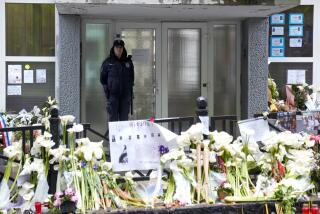Clinton Encouraged by Removal of Bosnia Weapons : Balkans: Serbs may need more time to comply, he suggests. President is ‘hopeful’ air strikes can be averted.
- Share via
WASHINGTON — President Clinton said Sunday that he is encouraged by signs that Bosnia-Herzegovina’s Serbs are removing their heavy weapons from around Sarajevo and suggested that they might need more time to comply with a NATO ultimatum.
A day after warning that U.S. warplanes stood ready to bomb any artillery not surrendered to U.N. control or pulled out from within a 12-mile radius of Sarajevo by 1 a.m. today Sarajevo time (4 p.m. Sunday Pacific time), Clinton told reporters that he had received “encouraging” news from NATO and U.N. commanders about the Serbs’ efforts to meet the deadline. He said he is “hopeful” that the need for air strikes can be averted.
“The Serbs seem to be moving weapons, and also bringing U.N. forces to the weapons that cannot be moved. So that much is encouraging,” Clinton said after attending a church service in Washington.
Shortly after the deadline for compliance with the NATO ultimatum passed, National Security Adviser Anthony Lake said, “All known heavy weapons have either been withdrawn from the exclusion zone, are under the control of the United Nations . . . or soon should be.
“The U.N. and NATO commanders have concluded that no air strikes are necessary at this time,” Lake said.
He said Clinton, who was in the White House as the deadline expired, had discussed the situation by telephone with NATO Secretary General Manfred Woerner.
Senior Administration officials said shortly before the deadline expired that no decision on whether to bomb remaining Serbian positions had been made--or would be made until the situation on the ground could be fully assessed. The assessment, they added, is unlikely to be completed until today at the earliest.
But they added that the Serbs have been engaging in what one official described as a “hectic” effort to comply with the North Atlantic Treaty Organization ultimatum.
“All day the Bosnian Serbs have been drawing heavy weapons out of the exclusion zone. We are confirming artillery sites that have been abandoned and are doing so all day,” the official said, adding that there was also a “dramatic increase” during the course of the day in the number of heavy weapons that the Serbs were surrendering to U.N. control in 10 designated collection areas.
Only a “relatively small number” of artillery sites had not been secured by U.N. forces because of “abysmal” weather conditions and snowbound roads, the official said.
“There has been tremendous progress,” the official added, expressing optimism that the remaining artillery sites will all be under U.N. control by today.
Despite their increasingly upbeat tone, Clinton and senior officials continued to insist that the deadline remains firm, with U.S. and other NATO warplanes prepared to launch air strikes against any heavy weapons that remained in the exclusion zone after Sunday night.
“It’s perfectly clear that the deadline is the deadline and that full compliance means just that. . . . NATO right now does not intend to give another warning,” Gen. John M. Shalikashvili, the chairman of the Joint Chiefs of Staff, said in an interview on NBC’s “Meet the Press.”
But with U.N. commanders in Sarajevo warning that the Serbs would not be able to remove all their weapons in time because of heavy snowfall, Shalikashvili and other officials also suggested that the deadline’s expiration meant only that the gun emplacements could be attacked at NATO’s discretion.
Clinton carefully made that point in his remarks outside the Episcopal church where he and his family attended services.
“The deadline only makes the artillery positions subject to attack,” he noted, adding that what happens afterward will depend on a U.N. and NATO assessment of “the facts on the ground.”
While Clinton said the Serbs had “plainly” not moved or surrendered all of their weapons around Sarajevo, he indicated that the heavy snows should be taken into account.
“I think we should keep the deadline . . . (but) there may or may not be some questions about whether all those weapons can be put into U.N. control, depending as much as anything else on the weather there,” he said.
U.S. Ambassador to the United Nations Madeleine Albright said that what the NATO allies “are looking for is an end to the shelling of Sarajevo.”
“The deadline extends into the future,” she told Cable News Network.
More to Read
Get the L.A. Times Politics newsletter
Deeply reported insights into legislation, politics and policy from Sacramento, Washington and beyond. In your inbox three times per week.
You may occasionally receive promotional content from the Los Angeles Times.









